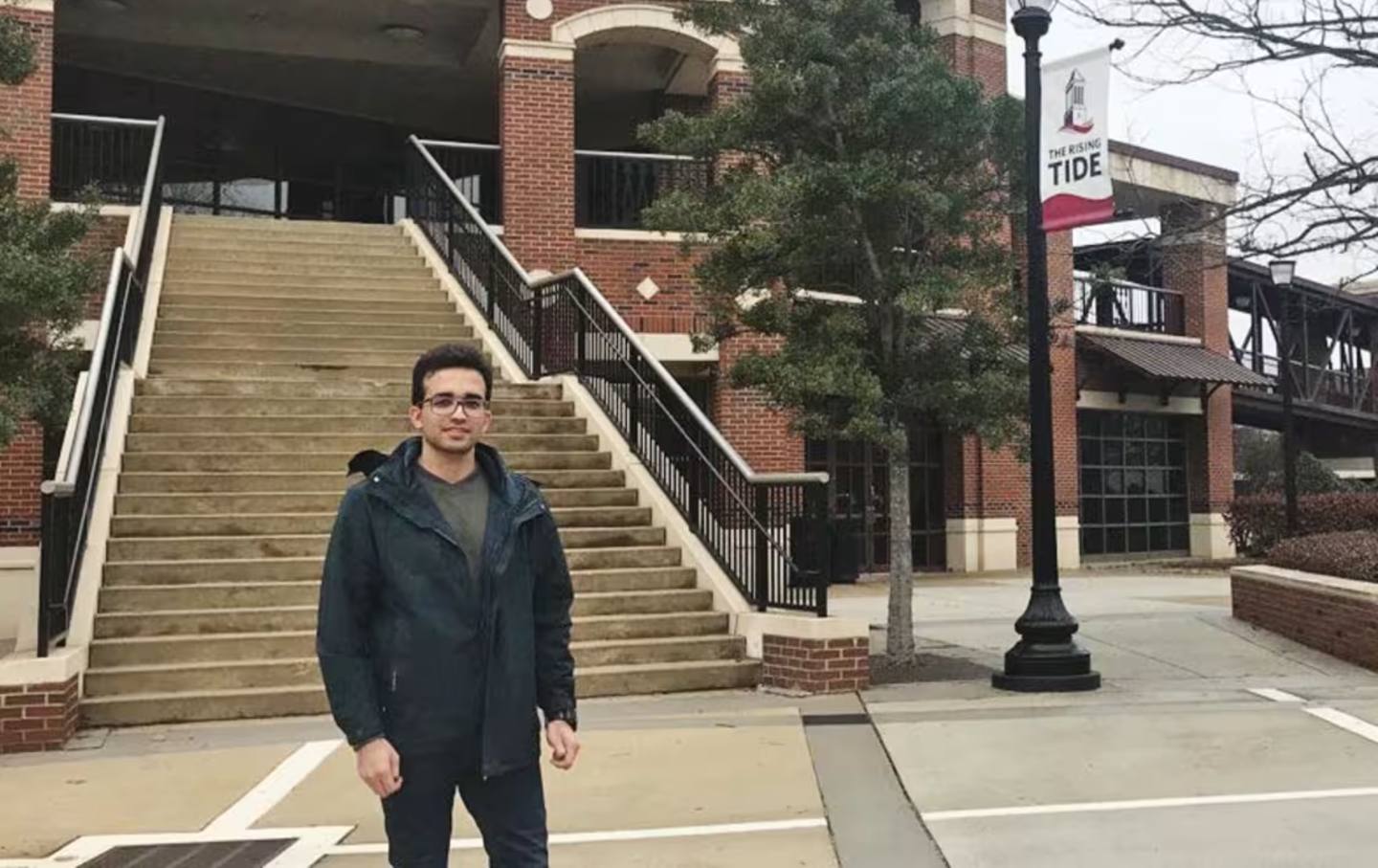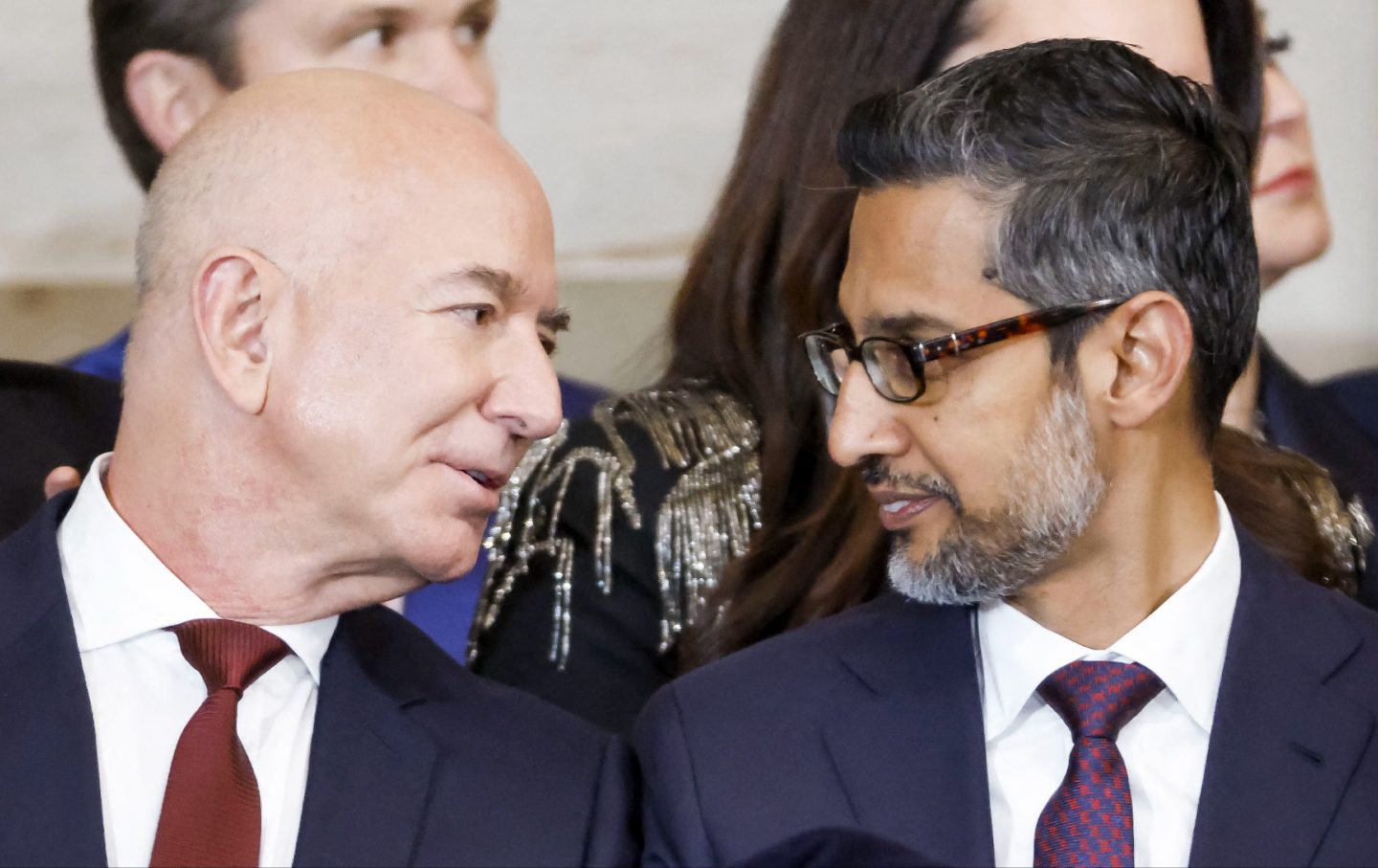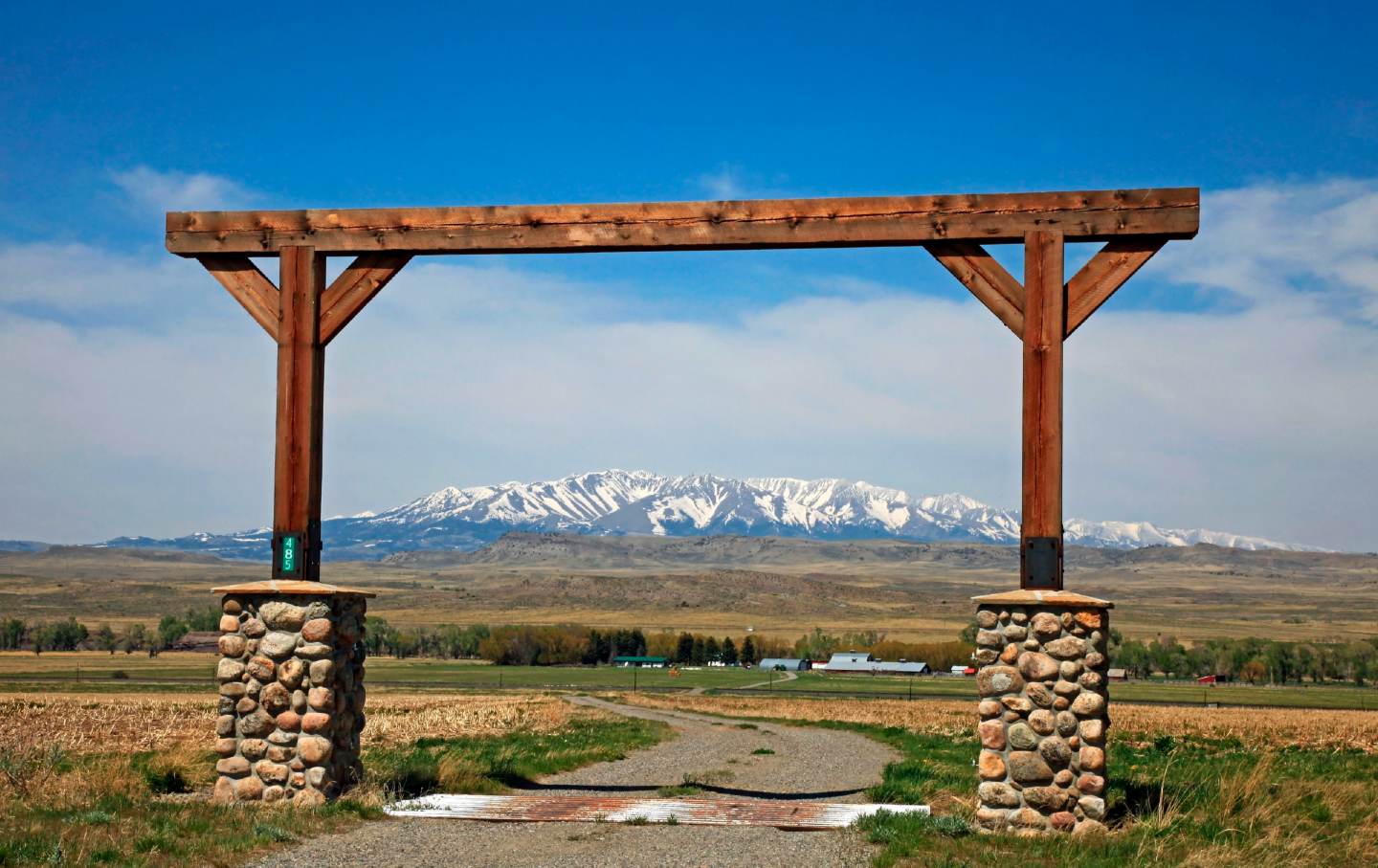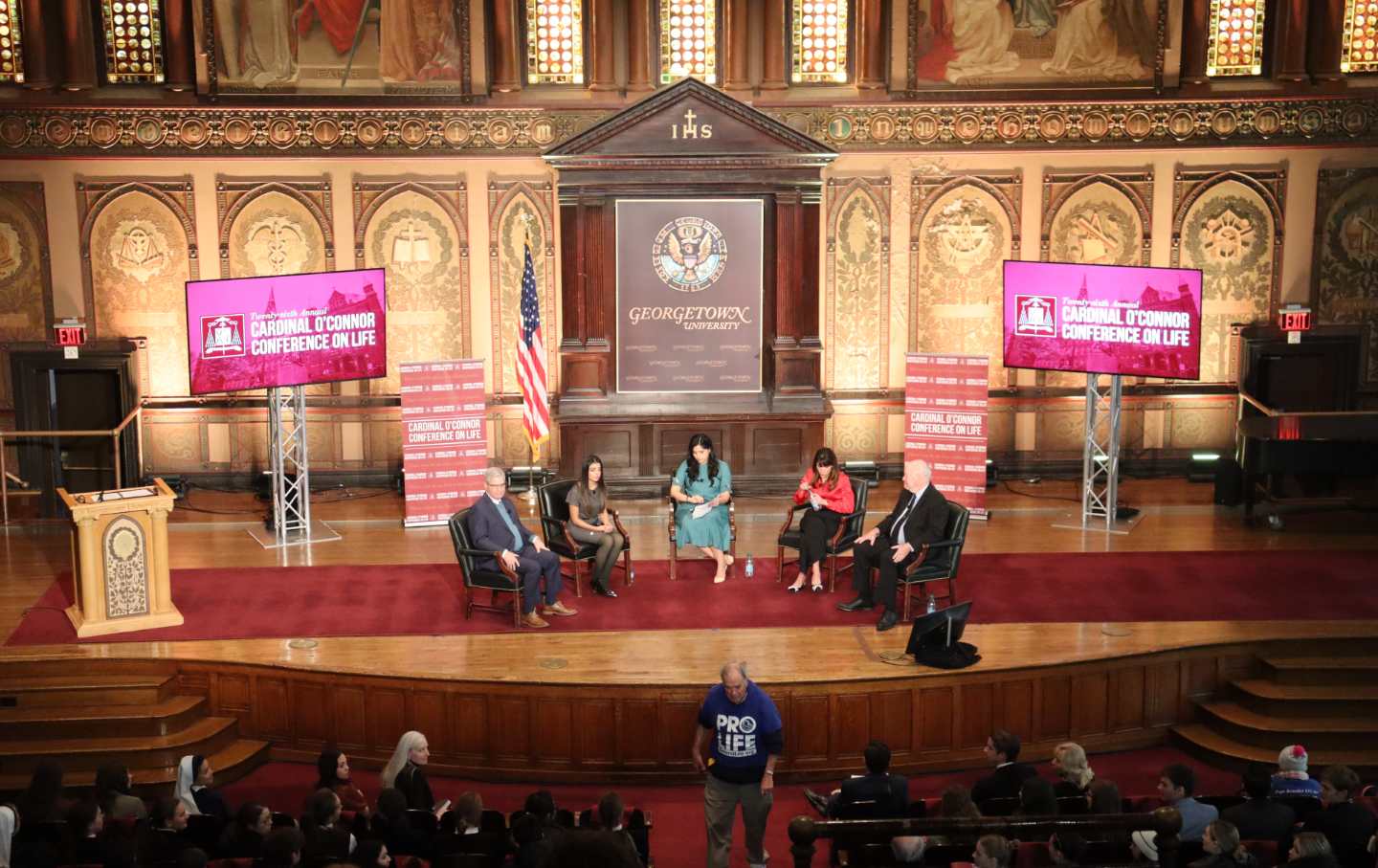Robert McChesney, the Great Champion of Journalism and Democracy, Has Died
The academic and activist inspired generations of people to challenge corporate power and support a media reform movement that lives on.

Bob McChesney on Moyers & Company in 2013.
(Moyers & Company)Bob McChesney, who died on Tuesday at the age of 72, first introduced himself to me almost 30 years ago, on the set of a public television news program in Madison, Wisconsin. Bob was a distinguished University of Wisconsin professor who was gaining an international reputation for his groundbreaking analysis of the threat to democracy posed by corporate control of media. Raising his arguments in books, speeches, and frequent C-Span appearances, he was well on his way to becoming one of the great public intellectuals of his time. I was a young newspaper editor who had earned a slim measure of recognition for my advocacy on behalf of investigative journalism and press freedom.
The program was framed as a debate about the future of journalism. Bob was positioned as the doomsayer, warning about how media consolidation was killing journalism. I was expected to counter that the future was actually bright. As it turned out, neither of us wanted to follow the script. Instead of arguing, we both agreed that profit-obsessed corporations were destroying American journalism, and that this destruction would pose an ever more serious threat to American democracy.
It wasn’t a particularly satisfying exchange for our hosts that evening, but it was the beginning of a collaboration that would span three decades. Bob and I cowrote half a dozen books and dozens of articles, joined Bill Moyers for a series of PBS interviews that would examine threats to journalism and democracy, and did our best, with more allies than we could have imagined in those early days, to stir up a reform movement that recognized the crisis and endeavored to set the stage for media that serves people rather than corporate bottom lines.
Bob, with his remarkable intellect and even more remarkable capacity for communicating his vision of a media that served citizens rather than corporations, was always the driving force. His research and his insatiable curiosity helped him to see the future more clearly than any scholar of his generation, with such precision that Moyers would compare him to both Tom Paine and Paul Revere. As new political and societal challenges arose in an ever more chaotic moment for America and the world, Bob explained how they should be understood as fresh manifestations of an ancient danger: the concentration of power—in this case, the power of the media, in the hands of old-media CEOs and new tech oligarchs, all of whom cared more about commercial and entertainment strategies than democratic and social values.
Bob took the “public” part of “public intellectual” seriously. You knew he wanted to swing into action when he’d say, “We need to put our heads together…” That was his call to write another book, organize another national conference on media reform, or rally another movement to defend the speak-truth-to-power journalism that the founders of the American experiment understood as the only sure footing for representative democracy.
Bob kept issuing the call, even as a series of health challenges slowed him down. He was still doing so a few days before his death following a year-long fight with cancer. His was a life fulfilled in the best sense of the word. He died a happy man, holding the hand of his beloved wife, Inger Stole, and reflecting on time spent with his daughters, Amy and Lucy.
Our last conversations recalled friends and colleagues who had answered his calls to save journalism and renew our democracy: Craig Aaron, Victor Pickard, Josh Silver, Kimberly Longey, Russell Newman, Derek Turner, Ben Scott, Joe Torres, Tim Karr, Matt Wood, Katrina vanden Heuvel, Michael Copps, Noam Chomsky, Amy Goodman, Bernie Sanders, Ralph Nader, the Rev. Jesse Jackson, and too many others to name. Bob loved scholarship, loved activism, and loved collaborating with people who made connections between the two—sharing writing credits with former students at UW-Madison and later at the University of Illinois at Urbana-Champaign, working with unions of media workers and, perhaps above all, strategizing with the team at Free Press, the media reform group he cofounded in 2003 to advocate for diversity in ownership, robust public media, net neutrality and always, always, democracy. Bob was frustrated by the oligarchical overreach now on display in the Washington of Donald Trump and Elon Musk—a development he had predicted with eerie accuracy. Yet he remained undaunted to the end, still spinning out fresh ideas for upending corporate control of media, getting Big Money out of politics, and ushering in a new era of freewheeling debate and popular democracy.
That was the essence of Robert Waterman McChesney. He was a globally respected communications scholar who was wholly welcome in the halls of academia, yet he was never satisfied working within an ivory tower. He was a rigorous researcher into the worst abuse of corporate and political establishments. Yet he refused to surrender his faith in the ability of people-powered movements to upend monarchs and oligarchs and, in the words of Tom Paine, “begin the world over again.”
Bob regarded Paine—the immigrant pamphleteer who rallied the people of his adopted country to dismiss King George III and the colonial enterprise, and who spent the rest of his life demanding that this new United States live up to the egalitarian promise of liberty and justice for all—as the essential founder of the American project. Like Paine, Bob believed that with information and encouragement, grassroots activists could carry Paine’s legacy forward into the 21st century. Countless people heeded his call.
“Bob McChesney was a brilliant scholar whose ideas and insights reached far beyond the classroom. He opened the eyes of a generation of academics, journalists, politicians, and activists—including mine—to how media structures and policies shape our broader politics and possibilities,” explained Craig Aaron, the co-CEO of Free Press. “While McChesney spent much of his career charting the problems of the media and the critical junctures that created our current crises, he believed fundamentally in the public’s ability to solve those problems and build a media system that serves people’s needs and sustains democracy. His ideas were bold and transformative, and he had little patience for tinkering around the edges. Rather than fighting over Washington’s narrow vision of what was possible, he always said—and Bob loved a good sports metaphor—that we needed to throw the puck down to the other end of the ice.”
Bob examined the relationship between media and democracy with scholarly seriousness. Yet he coupled that seriousness with a penchant not just for sports metaphors and references to rock-and-roll songs but spot-on cinematic analogies, which invited Americans to recognize the crisis. Speaking to Moyers about how America’s media policies were forged behind closed doors in Washington, by lobbyists and politicians, Bob succintly defined that process: “Pure corruption. This is really where Big Money crowds everything else out. The way to understand how policymakers make media in this country [is to watch] a great movie: The Godfather: Part II. There’s a scene early in the movie where all the American gangsters are on top of a hotel roof in Havana. It’s a classic scene featuring Hyman Roth and Michael Corleone. They’ve got a cake being wheeled out to them. And Hyman Roth is cutting up slices of the cake. The cake’s got the outline of Cuba on it, and they’re giving each gangster a slice of Cuba. And while he’s doing this, Hyman Roth’s [talking about how they can work with government to carve up Cuba in ways that make them all rich]. That’s how media policy is made in the United States.”
The accessibility of his speech—the way it turned something as potentially obscure as communications policy into a readily understandable issue—was Bob’s genius. He wanted to upend the money power and tip the balance toward systems that would empower working-class people—as opposed to billionaires—to shape the future of media: with strategies for giving citizens democracy vouchers that they could use to support independent media, and a host of other remedies. Like his friend Bernie Sanders, Bob believed it essential to have a media free enough from corporate influence to speak truth to economic and political power, boldly critique the excesses of capitalism, and raise the alarm against creeping oligarchy.
Popular
“swipe left below to view more authors”Swipe →This was the premise that underpinned an academic career that saw Bob author or co-author almost 30 books—including the groundbreaking Rich Media, Poor Democracy, his 1999 manifesto on how the decay of journalism would lead to a collapse of democratic norms, and 2013’s Digital Disconnect, his essential assessment of the danger of allowing Silicon Valley billionaires to define online communications. Many of the same themes ran through examinations of the shuttering of newspapers by corporate conglomerates that left communities as news deserts, of the destructive influence of political advertising on the national discourse, and of the failure of political and media elites to bring citizens into debates about automation, machine learning, and artificial intelligence. Noam Chomsky, whose own work on the media’s manufacturing of consent had profoundly influenced Bob’s scholarship (along with that of Ben Bagdikian, the journalist who wrote The Media Democracy), became Bob’s most ardent champion. “Robert McChesney’s work has been of extraordinary importance,” explained Chomsky. “It should be read with care and concern by people who care about freedom and basic rights.”
Bob’s research—and the books, lectures and activism that extended from it—earned him Harvard’s Goldsmith Book Prize, the Kappa Tau Alpha Research Award, the Newspaper Guild’s Herbert Block Freedom Award (for “having done more for press freedom than anyone”), and the International Communications Association’s C. Edwin Baker Award for the Advancement of Scholarship on Media, Markets and Democracy. It also gained him a hearing from thoughtful members of Congress, the Federal Communications Commission, and the Federal Trade Commission. Even if they did not always follow his advice, progressive officials recognized the wisdom of his analysis and incorporated it into their work. That’s one of the reasons why, in 2009, Utne Reader named Bob as one of “50 visionaries who are changing your world.” Charles Lewis, the founder of the Center for Public Integrity, simply referred to Bob as “the conscience of the media in America.”
Lewis wrote those words the better part of two decades ago. Bob remained that conscience, even as “media deserts” spread their arid path across America, as disinformation and misinformation overwhelmed the Internet, as propagandistic advertising warped our politics and as democratic expectations were undermined. It was all as he had predicted. But he was not inclined toward “I told you so” rejoinders.
Rather, Bob kept the faith that popular movements would push back against the decay, and the chaos, just as they had in the Progressive Era, the New Deal years, and the 1960s. “You’ve got to look in the mirror and understand that, if you act like change for the better is impossible, you guarantee it will be impossible,” he would say. “That’s the one decision each individual faces.”
Bob looked in that mirror confidently and courageously throughout a life of scholarship and activism. Some of our last conversations were about the huge crowds Bernie Sanders was attracting for his “Fighting Oligarchy” tour, and the thousands of Americans who have been showing up to challenge Republican members of Congress at town hall meetings. Just like Tom Paine, Bob saw fresh hope in the people who were rising up and demanding a future defined by their humanity, as opposed to corporate power. This might, he suggested, be the opening for a new surge in activism for journalism and democracy, a surge that might “begin the world over again.”
Bob’s last words to me, though they were a bit more labored due to his illness, were a repeat of his constant call to action: “Let’s put our heads together…” In other words, let’s make a plan. Let’s do something. That was his charge to those of us who cherished Bob McChesney’s mission and his spirit. We honor him best by accepting it.
Support independent journalism that exposes oligarchs and profiteers
Donald Trump’s cruel and chaotic second term is just getting started. In his first month back in office, Trump and his lackey Elon Musk (or is it the other way around?) have proven that nothing is safe from sacrifice at the altar of unchecked power and riches.
Only robust independent journalism can cut through the noise and offer clear-eyed reporting and analysis based on principle and conscience. That’s what The Nation has done for 160 years and that’s what we’re doing now.
Our independent journalism doesn’t allow injustice to go unnoticed or unchallenged—nor will we abandon hope for a better world. Our writers, editors, and fact-checkers are working relentlessly to keep you informed and empowered when so much of the media fails to do so out of credulity, fear, or fealty.
The Nation has seen unprecedented times before. We draw strength and guidance from our history of principled progressive journalism in times of crisis, and we are committed to continuing this legacy today.
We’re aiming to raise $25,000 during our Spring Fundraising Campaign to ensure that we have the resources to expose the oligarchs and profiteers attempting to loot our republic. Stand for bold independent journalism and donate to support The Nation today.
Onward,
Katrina vanden Heuvel
Editorial Director and Publisher, The Nation








